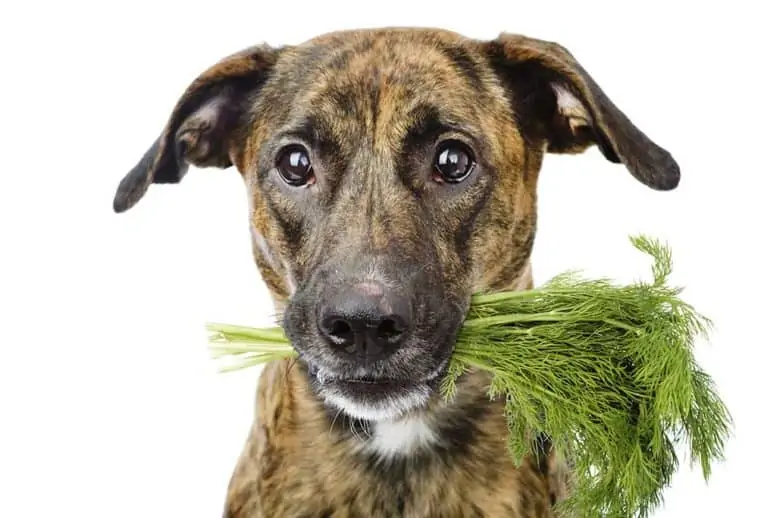Dill brings to mind creamy tzatziki dip and delicious potato salads, but did you know that this herb could also offer your pooch a myriad of health benefits? Dill is non-toxic for dogs and can not only add flavor to their food but can also aid digestion, help reduce toxins in their body and offer anti-inflammatory properties.
In this article, we’ll be covering the health benefits of dill and how to feed it to your dog. Before we get into that though, what actually is dill?
Table of Contents
What is dill?
Dill (Anethum graveolens) is an annual herb in the celery family Apiaceae, and is the only species in the genus Anethum. Dill is widely grown in Eurasia, where its leaves and seeds are used to season and flavor dishes.
Dill has a mild grassy taste with a hint of licorice flavor. Once the weather turns hot, dill plants flower or “bolt”, and this changes the flavor of the leaves, causing them to turn more bitter. Dill seed tastes like a mild version of caraway and are used as a spice in cooking.
Dill is used in a range of dishes, from cold soups featuring beets, cucumbers, or yogurt, or in tzatziki, the traditional Greek cucumber yogurt salad. It also works well with seafood, spreads, sour cream, cream cheese, and lamb.
The benefits of dill for your dog
Digestive Aid
Many dogs struggle with digestive issues, and it’s not surprising considering many of them are continually picking up whatever scraps of food they can get their paws on! If this sounds like your dog, dill might come in handy, as it’s known to aid in digestion, helping to reduce gas, nausea, cramping and bloating.
Breath Freshener
As a member of the parsley family, dill may be an effective breath freshener for your pup. This comes down to its antibacterial powers that can help tackle foul breath caused by bacteria and even gingivitis.
Antioxidant
Dill contains antioxidant flavonoids, including kaempferol and vicenin. Kaempferol has been linked to a range of health benefits, including anti-inflammatory, anti-cancer, cardio-protective, neuro-protective, and anti-diabetic properties.
Vicenin on the other hand may help protect cells and chromosomes from oxygen-based damage, radiation, and damage caused by free radicals – which can lead to chronic diseases like cancer, and joint and organ diseases.
Anti-inflammatory
Dill also has anti-inflammatory properties, making it a great option for dogs suffering from arthritis, digestive issues, or any other conditions involving inflammation. Used externally, its juice can help ease skin irritations and reduce inflammation such as heat rash.
Flea Repellent
Dill is also thought to serve as a natural bug repellent, so it may be effective for keeping fleas, ticks, and mosquitoes at bay during the summer months.
For fleas, a rinse made with dill, feverfew flowers, and yarrow is said to be effective, and what’s more, dill’s naturally occurring chemical, carvone, is believed to enhance the effectiveness of other natural insecticides. Ground dill seeds may also help dispel intestinal worms.
Vitamins and minerals
Dill is rich in vitamins and minerals that are beneficial to humans and dogs alike. Just one teaspoon of dill seeds contains calcium, iron, magnesium, phosphorus, potassium, sodium (trace amount), zinc, thiamine, riboflavin, niacin, Vitamin A, and a variety of amino acids and dietary fiber.
It also boasts anethofuran and limonene, which boost the production of cancer-fighting enzymes like glutathione S-transferase – which reacts with certain types of carcinogenic chemicals to eliminate them from the body.
Dill, like parsley, is considered a chemoprotective food and has also been shown to have antibacterial qualities similar to garlic. It’s not an allergenic food and does not contain measurable amounts of oxalates or purines.
Feeding your dog dill

Dill is safe and nutritious for dogs, but like anything, it’s best fed to your dog in moderation, especially if it’s the first time your dog is tasting the herb. Feed your dog dill in small quantities, as a little bit of dill goes a long way, so avoid feeding them more than one tablespoon at a time.
When it comes to feeding your dog dill, it’s probably best to just add it into their normal wet or dry dog food. If you feed your dog dill by itself, it may be put off by the bitter taste and feathery texture.
You can chop up the dill finely and sprinkle it into your dog’s food. You can also add a small amount to your dog’s water, which will provide a natural flavoring, though it’s best to keep the dosage somewhere between one teaspoon and one tablespoon.
If you’re unsure about feeding your dog dill, you can consult with your vet first to ensure it’s safe for your dog and that it won’t interact with any pre-existing conditions or medications.
You can also consider making a dill seed tea so your dog can reap the benefits of the seeds.
For this, add 1 tsp. of dill seed to 8 oz. of water and feed 2-8 oz. to your dog once it has cooled down. If your dog isn’t a fan of the taste, Herbs for Pets recommends trying unsalted broth instead of water for additional flavor.
Always use dill with caution when it comes to pregnant or lactating animals, and consult a holistic vet before introducing it into their diet.
Final Say
Who knew that dill could be so beneficial for your pup? This feathery green herb can offer digestive, anti-inflammatory, anti-oxidant, and breath-freshening benefits for your pooch, and it’s super easy to add a sprinkle to their food or water. Next time your pet has been garbage surfing or is smelling a little gassy, you’ll know to reach straight for the dill!

